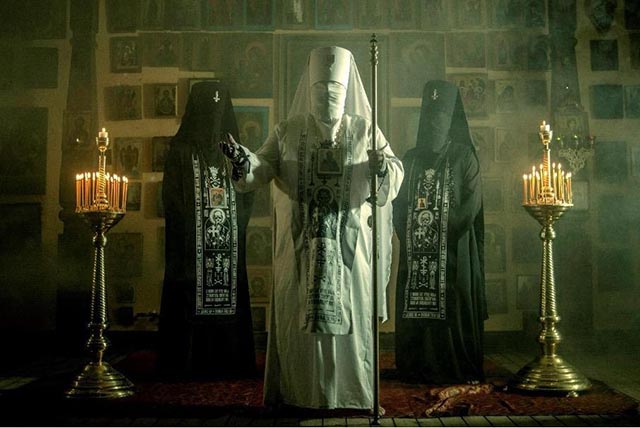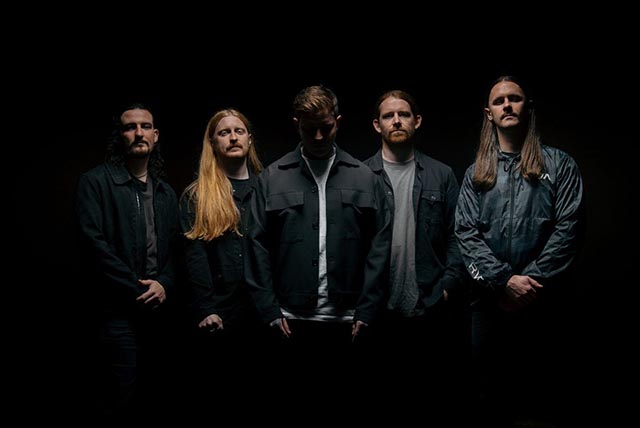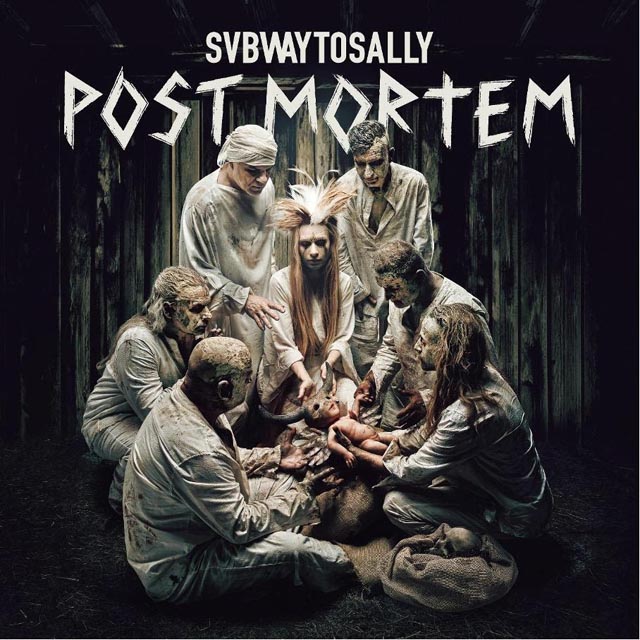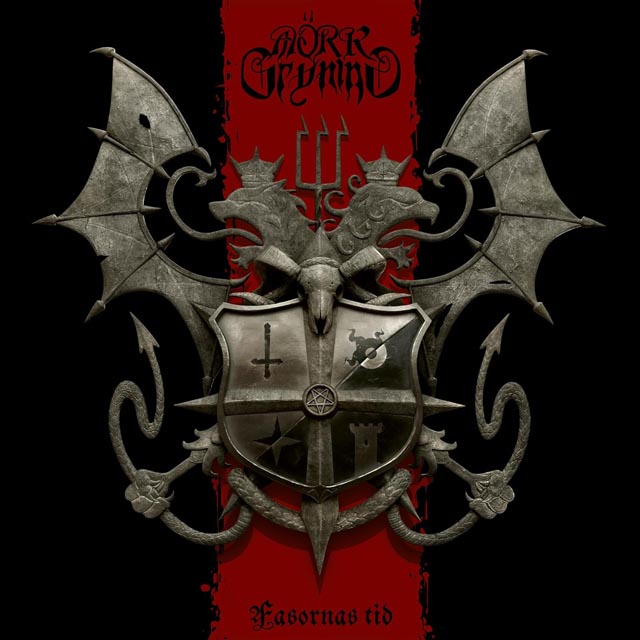 For the past 21 years, singer Lance King has been the voice of numerous powerhouse metal and prog groups, including bands like Pyramaze, Avian, and Balance Of Power to name a few). During that time, King has also been working behind the scenes in the industry, running his own independent label Nightmare Records. This past Summer, though, King decided to embark on a new journey: his first solo record. But rather than going at it alone, King collaborated with numerous prog/power metal heavyweights, including members of Anubis Gate, Jorn, Beyond Twilight, and many others. What resulted in under three months was A Moment In Chiros, which will be released on November 11/8.
For the past 21 years, singer Lance King has been the voice of numerous powerhouse metal and prog groups, including bands like Pyramaze, Avian, and Balance Of Power to name a few). During that time, King has also been working behind the scenes in the industry, running his own independent label Nightmare Records. This past Summer, though, King decided to embark on a new journey: his first solo record. But rather than going at it alone, King collaborated with numerous prog/power metal heavyweights, including members of Anubis Gate, Jorn, Beyond Twilight, and many others. What resulted in under three months was A Moment In Chiros, which will be released on November 11/8.
With less than two weeks away from the release of his first solo album, King took a break from his already hectic schedule to talk with Metal Insider. During our chat, King discussed the recording process of A Moment In Chiros, his vision for touring possibilities with a solo band in each continent, the birth of Nightmare Records and its surprise growth, and the effects technology has had on the recording industry. Metal Insider is also proud to premiere a song off of A Moment In Chiros called “222. Awakening,” which can be heard in the stream below.
[audio:https://metalinsider.net/wp-content/uploads/2011/11/222.-Awakening-2.mp3|titles=”222. Awakening” by Lance King]You’ve been singing in many prog/power metal bands now for the past two decades. What inspired you to record your first solo album A Moment In Chiros?
Well I think it had a little bit to do with band drama [laughs], and the fact that I think I’ve grown beyond some of the situations that I’ve been in [in the past]. I know a lot of great musicians that I hadn’t had an opportunity to play with, and that always seems to bring out a lot of interesting new creativity and dynamics working with new people. So I thought this would be a blast to work with a bunch of musicians I really respected what they’ve done in the past and see what happens creatively between us.
You really did bring together an extensive all-star lineup of collaborators for this album. How did you go about choosing who you wanted to work with?
Well it really came down to who I respected and admired their music and creativity, and who I knew. It was pretty much people that I’ve worked with or known in some capacity, but never worked musically with. I basically made a three page email with the concept that I wanted to put out, and I just bcc’d/add copied everybody on it [laughs]. There were probably about seven other musicians that I had invited that just didn’t have the time, didn’t respond, or didn’t give me much feedback, and a few did but the ideas didn’t gel or didn’t hit me right, motivate or inspire me.
So basically after I sent out this email, and in two weeks I had about two albums worth of material musically speaking, or at least two albums worth of ideas. And I just went through them, listened to everything, and said “Hey, here’s the keepers. Here’s what inspired me and what sounded good to me.” And those are the songs that I focused on, and then I started writing the album in sequence. Actually, I just started picking the right music for the right concept for each song that I felt worked well, and just went one right after the other right through the end of the album. It was really interesting. I had never done it that way before, and it worked really well [laughs]. It worked really well. In two months, we basically wrote the entire album and demoed it up, and in three months it was fully recorded and mixed. So it’s quite a feat [laughs], but I’m really happy with the result.
I was just about to note how fast this album was recorded. Were you shocked at how it seemed easier to work with a variety of musicians rather than one lineup?
Well yeah, because what’s happening is, and I realized it after I had gotten into it, I knew it could work, but I didn’t know for sure if it would, and basically you’ve got a lot more cooks working on the sauce. You’ve got a lot more writers involved, and so I was in essence working with eight different people on the album at any given time rather than typically working with one other writer or maybe two in a band. So it sped things up a lot, and I’m really fast with my end of things, with melodies and lyrics, so it wasn’t a problem to keep up, fortunately.
You mentioned that there were a few musicians you tried to contact or work with but that didn’t work out. Is there one particular name you would’ve liked to collaborate with for the album?
Yeah there was one. I would’ve really liked to work with Jørn Viggo Lofstad [guitarist] from Pagan’s Mind. Jørn was on tour the moment I sent this out, though. They were out touring. That I think would’ve been a lot of fun.
Do you think you’ll ever go back to recording with a band, or will you continue to record music with a variety of musicians?
I think that I’m going to leave that door open. I’m not going to make any concrete decisions on it. I think that times change and things happen. I don’t know what the future holds. I know that I’d like to do another album like this, and depending on how it’s received and if there’s touring involved, that may play into what the future holds. Maybe a touring lineup might just be a real good creative lineup as well, I don’t know.
Well, I was just going to ask, do you have any plans to tour behind A Moment In Chiros?
I’d like to go out and do the festivals and possibly some club dates next Summer, and I’d like to the European market. And now is the time I need to be focused on that, actually. I need to start contacting all of the festivals. But yeah, I would love to go out and play. I don’t know that it’s financially viable at the moment yet. We need to do some digging and see if it can work. But the one thing about the way I’m doing it is that I could potentially have a band in Europe and a different band in the States, a different band in Brazil, probably not a different band in Japan. But it would cut down on the traveling expenses and on the work visas. Everything would be a lot easier and faster, probably. I don’t know, I could have a band in all three places rehearsing the music and just show up, go through it a day before with my parts and slam it out [laughs]. It potentially seems like a very good idea.
And in fact, I’ve talked with a couple of other singers that have done that in the past. I’ve noticed that Jørn [Lande] has done that, and Rob Rock has done that a bit. We’ve [him and Rob Rock] even thought about sharing bands, going out and touring together and doing things in that nature. And that seems to make more sense as a solo artist.
That would be really cool to see, especially if you were able to combine bands.
Right! Essentially we’d just have one band that was slammin’ and would back all the vocalists. And that could be a really good thing. It could be economical. I mean, it’s gotten very challenging to get out there and see any kind of reasonable crowds. Just touring expenses are so expensive, and it makes sense to bring that all down into a little tighter of a package.
While most fans may know you for your work as a singer, you’ve also gained a great amount of success through your label Nightmare Records. You originally started the label back in 1990 to self-release your band at the time Gemini’s self-titled debut, but Nightmare Records has since released a large sum of albums from a variety of prog and power metal groups. Did you ever expect Nightmare Records to grow in the way it has?
Yeah [laughs]. I actually didn’t expect it to get as big as its gotten. I had set out for it to be a part time thing. I set out for it to be a supplementary income, not my main bread and butter and my main focus, which it’s become daily. It’s pretty all consuming, to be honest. It’s a great thing. It’s kind of like a musician’s wet dream in that you get to talk to a lot of really great people and work with a lot of great people, and it’s just a lot of fun that way. There’s a lot of work involved as well, but it’s been a great thing. I can’t complain about it at all. It’s exactly what I had set out to do and then some.
Was there any instance that made you realize that Nightmare Records had potential to become more than just a way to release your own albums and actually work with other bands?
Oh yeah, I mean there’s always power in numbers. When I first started it, it was mainly as a distribution idea to help my local friends. I knew a lot of bands from around my area. And I had managed to gain some success with Gemini and we had gotten a European distribution deal, and I basically thought “Well hey, I’m only putting out albums so often, and I want to keep these contacts alive and well. How can we keep this moving?” It made a lot of sense to talk to the rest of my friends in the area to see if they wanted me to help do their distribution. And everybody was really excited about it, and it seemed to really start the wheels in motion. It worked really well.
You’ve started to touch upon this earlier, but what would you say are the biggest hardships of running an independent label while also being in a band or recording music?
That is a big challenge. I think the biggest challenge of it is trying to maintain being magnanimous and fair. When you’re promoting all of these things, naturally you’re going to gravitate towards your own thing. And fortunately I guess the balance is struck by doing everyone else’s a lot more often than mine [laughs]. So I kind of get use to just looking at an album as an album instead of ownership over it. It’s just working it in the same capacity on every one of them. To some degree, I mean there’s some special things you do for each artist that makes more sense for them when opportunities arise, which there are always different opportunities that come up at different times that you can take advantage of. So it becomes a “when the timing is right” kind of thing.
But yeah, it is a challenge, especially when I’ve had the opportunity to go out and tour. That has become a bit of a challenge and a bit of an issue. Now with technology, it does make it a whole lot easier. With iPhones, laptops and wifi everywhere along the way, you can pretty much keep up with a lot of it where as even ten years ago that was a lot harder.
So would you say then that technology has served as the best tool for you in juggling both your work as a musician and with the label?
It definitely has been. It’s a double edged sword. I mean, it’s got some great powerful things that it brings to music, and it’s got some negative aspects as well. The file sharing aspect of technology is probably a negative of it, but by the same token, and all of the media, it’s just there for everybody. It’s piped into your home and every possible avenue. And people aren’t going out to shows as much because of it. Probably everybody can watch a show on YouTube on their iPhone or iPod or their whatever phone they have these days. It’s just gotten to be such an overload of media that some things just aren’t as special anymore. Like going out to a show, it use to be really something and now it seems that people aren’t going out as much.
So there’s some pluses and negatives, but by the same token, because of technology, recording is a whole lot easier and a lot cheaper to do and graphic arts, ect. The list goes on. Everything’s made easier in a lot of ways, communication for sure. So yeah, technology has just sped everything way up, and so in order to keep up you have to have it.
Speaking of new technology, many independent labels have taken issue with streaming services such as Spotify, namely over the rate being paid to artists and labels. I was wondering if you had any thoughts on this, or even if Nightmare Records has had any altercations with sites like Spotify.
You know honestly, I haven’t explored the model terribly much. I haven’t looked into all the pluses and minuses of it. I know that there are some. Century Media made it obvious that they weren’t going to do that because they thought it was a bad idea. There’s been other sites much like that. Last fm., Rhapsody and Napster are services that don’t pay out anything, really. They’re these, what do you call them? I’m forgetting the terminology. Streaming services that are more subscription [based]. And the subscription service model doesn’t really do anything because people get all their music for $9.99. Half that off the top goes to the service, then the other half is split amongst all of the other artists they downloaded during that term for stream. So potentially if they only did ten songs then that wouldn’t be a big deal, but those that are doing two hundred to two thousand, you’re talking about a tenth of a cent or less [laughs]. So it becomes kind of a joke in that capacity.
And Spotify, I don’t know what the model is really, but what I do know is that a lot of people are using it now. In Europe, it’s been a huge thing. And all of the artists want to be on it, and everybody is excited about it. It’s the new thing that’s a double edged sword. It’s got great things for the customers and great potential for the artists, but at the same time it remains to be seen how it’ll play out.
With your experience running Nightmare Records for over two decades now, do you have any thoughts on how labels should move forward in the current digital age?
Well, there’s a lot of discussion about that. There’s a lot of artists and there’s a lot of labels and music industry professionals that are saying that you’ve got to look at this as the cat’s out of the bag, you’ve got to handle it in creative ways when dealing with the digital scene. You can’t put the genie back in the bottle, so to speak, and that’s really true. There’s no going back. So in order to deal with the front that we have and try to do this, you have to be much more conservative with everything. You’ve got to realize that sales are going to be about probably 2% of what they were twenty years ago, and you’ve got to conform to that and realize that a lot of fans consider it [music] as a freebie privilege. And working that model of thinking as “Well, what can I give away to get them interested?” Instead of giving a whole album away, give a couple of songs and be generous. Give it to them. Let them have it and if they like it, maybe they’ll buy the album. That’s kind of the mentality you have to have.
So I’ve been doing that with my label where we give away essentially the sampler albums, package it up like it is its own album with a variety of artists on it, and it’ll be about an hour of free music. Just give it away. And in that, we get their contact info so we can let them know what we’re doing with our new releases. That’s the exchange and a lot of people like that. That’s been working really well. At least we have their contact information and we can let them know what we have in stock. They’ll come back and check it out, and maybe they’ll like it, maybe they’ll buy it. That’s the way you’ve got to go with it.
It being the digital age, the one beautiful thing about it is that you put something on YouTube and the social media, somebody “likes” it or favored it, it spreads like wildfire among all their friends. If it’s good it can take off, if it’s not then nothing’s going to happen with it. But that’s kind of the nice thing about it. It can be a really great thing for certain artists that are deserving of it. Same kind of thing with the Soundcloud, I guess. You can post Soundcloud samples and share it with your friends, and it could go viral. It might get a lot of people’s interest. So there’s ways to promote your music that are free nowadays with technology that there wasn’t before, and I guess the playing field is leveled with a lot back and forth and there’s a lot less money involved in everything [laughs].
The payout isn’t as good.
Right, and unfortunately with technology, that I’ve seen anyways, is that it’s sped things up so much that places like your standard radio broadcast and even television and movies, everything is going more to digital. Print magazines are having a hard time with things. There was once a much easier way to market because you only had certain avenues that everyone was looking at. And there would be like three or four major magazines in the States that were metal and hard rock, and that’s where people looked and it had shelf life. And there were only certain radio stations that people would hear it on. Now, the internet is your oyster. You can do a Google search and there could be 250,000 places that you could see something on that. Which one are you going to go to? So it becomes the challenge of advertising, it becomes a challenge of knowing where to go [laughs] when you’re a consumer as well. But I don’t know, it’s still a great thing. I think it’s just become really spread out, I guess is what I would notice. Lots and lots of different places to be [laughs].






